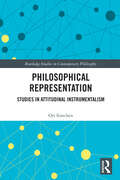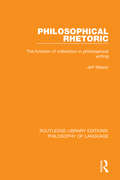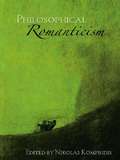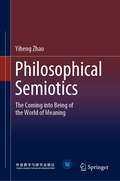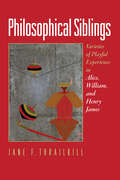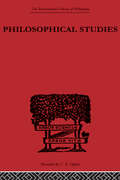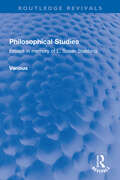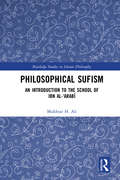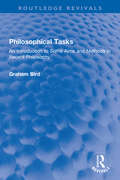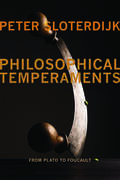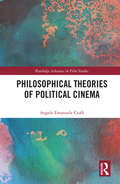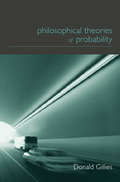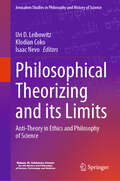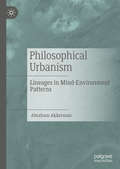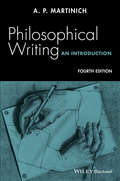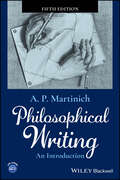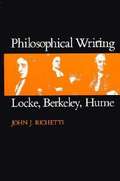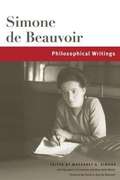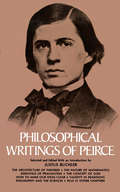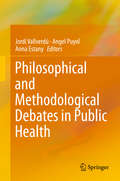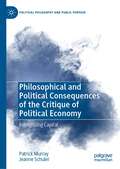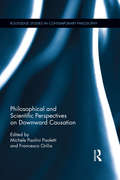- Table View
- List View
Philosophical Religions from Plato to Spinoza
by Carlos FraenkelMany pagan, Jewish, Christian and Muslim philosophers from Antiquity to the Enlightenment made no meaningful distinction between philosophy and religion. Instead they advocated a philosophical religion, arguing that God is Reason and that the historical forms of a religious tradition serve as philosophy's handmaid to promote the life of reason among non-philosophers. Carlos Fraenkel provides the first account of this concept and traces its history back to Plato. He shows how Jews and Christians appropriated it in Antiquity, follows it through the Middle Ages in both Islamic and Jewish forms and argues that it underlies Spinoza's interpretation of Christianity. The main challenge to a philosophical religion comes from the modern view that all human beings are equally able to order their lives rationally and hence need no guidance from religion. Fraenkel's wide-ranging book will appeal to anyone interested in how philosophy has interacted with Jewish, Christian, and Muslim religious traditions.
Philosophical Representation: Studies in Attitudinal Instrumentalism (Routledge Studies in Contemporary Philosophy)
by Ori SimchenThis book focuses on how we should treat philosophy’s theoretical representations. It argues in favor of an instrumentalist attitude towards pivotal cases of theoretical representation in philosophy that are commonly regarded under a realist attitude. Philosophy is awash with theoretical representations, which raises the question of how we should regard them. This book argues that representations in philosophy should not be regarded under a realist attitude by default as individually disclosing the nature of what they represent. Ori Simchen introduces the reader to the general theme of representations in philosophy and our attitudes towards them via case studies: numbers, modality, and belief. He offers a framework for deciding when a realist attitude towards a theoretical representation is warranted and concludes that the representations deployed in the case studies fail the proposed test. The next part of the book illustrates the attractiveness of attitudinal instrumentalism towards representations in semantics, in the philosophy of mind, and within the problematics of rule-following. Philosophical Representation will appeal to researchers and advanced students working in philosophy of language, philosophy of mind, metaphysics, philosophical logic, and philosophical methodology.
Philosophical Rhetoric: The Function of Indirection in Philosophical Writing
by Jeff MasonThis book, originally published in 1989 discusses an issue central to all philosophical argument – the relation between persuasion and truth. The techniques of persuasion are indirect and not always fully transparent. Whether philosophers and theoreticians are for or against the use of rhetoric, they engage in rhetorical practice none the less. Focusing on Plato, Descartes, Kant, Kierkegaard, Nietzsche and Wittgenstein, this book uncovers philosophical rhetoric at work and reminds us of the rhetorical arena in which philosophical writings are produced and considered.
Philosophical Romanticism
by Nikolas KompridisPhilosophical Romanticism is one of the first books to address the relationship between philosophy and romanticism, an area which is currently undergoing a major revival. This collection of specially-written articles by world-class philosophers explores the contribution of romantic thought to topics such as freedom, autonomy, and subjectivity; memory and imagination; pluralism and practical reasoning; modernism, scepticism and irony; art and ethics; and cosmology, time and technology.While the roots of romanticism are to be found in early German idealism, Philosophical Romanticism shows that it is not a purely European phenomenon: the development of romanticism can be traced through to North American philosophy in the era of Emerson and Dewey, and up to the current work of Stanley Cavell and Richard Rorty. The articles in this collection suggest that philosophical romanticism offers a compelling alternative to both the reductionist tendencies of the naturalism in 'analytic' philosophy, and deconstruction and other forms of scepticism found in 'continental' philosophy. This outstanding collection will be of interest to those studying philosophy, literature and nineteenth and twentieth century thought.
Philosophical Semiotics: The Coming into Being of the World of Meaning
by Yiheng ZhaoThis book attempts to solve the question whether semiotics is a methodology as is generally held and if the studies of meaning and the mind can shed light on a series of metaphysical issues, so that the edifice of semiotics could be erected on a philosophical ground. It proposes that a philosophical semiotics is, by necessity, a semiotic phenomenology about the construction of the “world of meaning” by signs, and any discussion about semiotics has to proceed around two core issues: meaning and the mind.This book particularly exemplifies the semiotic connections in various schools of traditional Chinese philosophies. In the “Pre-Imperial Age” (before BC 300), there emerged an abundance of semiotic thinking in China, from Yijing the first sign system that aims to explain everything in the world, to the Namists’s subtle argument about the form of meaning, from the Yin-Yang/five elements of the Han, to the “Things are non-existent while mind is non-non-existent” principle of the Vijñāptimātratāsiddhi School of Buddhism in the Tang, and from the Sudden Revelation of Chan Buddhism to the “Nothing outside the mind” endorsed by the Mindist Confucianism in the Ming. The mighty trend of philosophical heritage provides rich food to our understanding of the form of meaning.
Philosophical Siblings: Varieties of Playful Experience in Alice, William, and Henry James
by Jane F. ThrailkillAlice James: an exemplary nineteenth-century neurasthenic and diarist. William James: a foundational figure for American psychology and philosophy. Henry James: a preeminent author and literary critic. These three iconic figures of nineteenth-century American culture and letters were also siblings, children of the storied James family, yet the diarist, the psychologist, and the novelist have seemed to occupy distinct realms of cultural authority and to speak to different audiences (or, in the case of Alice, to no audience at all). Their writings have rarely been considered together.In Philosophical Siblings Jane F. Thrailkill asks what new story is illuminated when we study their writings collectively. By approaching the Jameses as intimate thinkers operating on a common field of play, Thrailkill reveals the siblings' shared project—part psychological, part philosophical—of showing how minds meet in a world teeming with possibilities and risks. Scientists in nineteenth-century psychology labs were studying isolated individuals, tracking eye movements, and timing reactions to better understand the human machine. In contrast, the Jameses' models for discovery were philosophical toys: ludic devices that light up quirks of perception and are devilishly fun as well. With childlike humor, the siblings' intellectual playfulness is both message and medium, manifested in an expressive style that exploits incongruity, delights in absurdities, and sometimes, teasingly, inflicts the sting of critique.Most important, the Jameses' writings model how human beings accomplish high-wire acts of perception and creation. Alice, William, and Henry James did not merely present a new, interactive theory of mind; they dramatized it in their writings as a curiosity-based practice. Philosophical Siblings accepts their invitation to mindful play and offers a fresh way of thinking about literary encounters more generally, one that approaches even the weightiest texts with serious lightness.
Philosophical Studies (International Library of Philosophy)
by G.E. MooreFirst published in 2000. Routledge is an imprint of Taylor & Francis, an informa company.
Philosophical Studies: Essays in memory of L. Susan Stebbing (Routledge Revivals)
by VariousFirst published in 1948, Philosophical Studies presents a collection of essays written by friends and colleagues of Professor L. Susan Stebbing in the Aristotelian Society. Most of these essays do not bear directly on Professor Stebbings’ work, but they deal with problems which she discussed time and again at the Society’s meetings. It explores themes like moral ends and means; reflections occasioned by ideals and illusions; reason in history; the logic of elucidation; logic and semantics; philosophy of nature; and epistemology and the ego-centric predicament. This book is a must read for students and scholars of Philosophy.
Philosophical Sufism: An Introduction to the School of Ibn al-'Arabi (Routledge Studies in Islamic Philosophy)
by Mukhtar H. AliAnalyzing the intersection between Sufism and philosophy, this volume is a sweeping examination of the mystical philosophy of Muḥyī-l-Dīn Ibn al-ʿArabī (d. 637/1240), one of the most influential and original thinkers of the Islamic world. This book systematically covers Ibn al-ʿArabī’s ontology, theology, epistemology, teleology, spiritual anthropology and eschatology. While philosophy uses deductive reasoning to discover the fundamental nature of existence and Sufism relies on spiritual experience, it was not until the school of Ibn al-ʿArabī that philosophy and Sufism converged into a single framework by elaborating spiritual doctrines in precise philosophical language. Contextualizing the historical development of Ibn al-ʿArabī’s school, the work draws from the earliest commentators of Ibn al-ʿArabī’s oeuvre, Ṣadr al-Dīn al-Qūnawī (d. 673/1274), ʿAbd al-Razzāq al-Kāshānī (d. ca. 730/1330) and Dawūd al-Qayṣarī (d. 751/1350), but also draws from the medieval heirs of his doctrines Sayyid Ḥaydar Āmulī (d. 787/1385), the pivotal intellectual and mystical figure of Persia who recast philosophical Sufism within the framework of Twelver Shīʿism and ʿAbd al-Raḥmān Jāmī (d. 898/1492), the key figure in the dissemination of Ibn al-ʿArabī’s ideas in the Persianate world as well as the Ottoman Empire, India, China and East Asia via Central Asia. Lucidly written and comprehensive in scope, with careful treatments of the key authors, Philosophical Sufism is a highly accessible introductory text for students and researchers interested in Islam, philosophy, religion and the Middle East.
Philosophical Tasks: An Introduction to Some Aims and Methods in Recent Philosophy (Routledge Revivals)
by Graham BirdFirst published in 1972, Philosophical Tasks was written to identify and examine some central themes in contemporary Anglo-American philosophy. The book explores the claim that philosophy is essentially linguistic, and considers in particular such topics as philosophy and science, fact and language, conceptual analysis, first- and second-order tasks, scepticism, ordinary language, and conceptual frameworks.
Philosophical Temperaments
by Thomas Dunlap Creston Davis Peter SloterdijkPeter Sloterdijk turns his keen eye to the history of western thought, conducting colorful readings of the lives and ideas of the world's most influential intellectuals. Featuring nineteen vignettes rich in personal characterizations and theoretical analysis, Sloterdijk's companionable volume casts the development of philosophical thinking not as a buildup of compelling books and arguments but as a lifelong, intimate struggle with intellectual and spiritual movements, filled with as many pitfalls and derailments as transcendent breakthroughs.Sloterdijk delves into the work and times of Aristotle, Augustine, Bruno, Descartes, Foucault, Fichte, Hegel, Husserl, Kant, Kierkegaard, Leibniz, Marx, Nietzsche, Pascal, Plato, Sartre, Schelling, Schopenhauer, and Wittgenstein. He provocatively juxtaposes Plato against shamanism and Marx against Gnosticism, revealing both the vital external influences shaping these intellectuals' thought and the excitement and wonder generated by the application of their thinking in the real world. The philosophical "temperament" as conceived by Sloterdijk represents the uniquely creative encounter between the mind and a diverse array of cultures. It marks these philosophers' singular achievements and the special dynamic at play in philosophy as a whole. Creston Davis's introduction details Sloterdijk's own temperament, surveying the celebrated thinker's intellectual context, rhetorical style, and philosophical persona.
Philosophical Temperaments: From Plato to Foucault (Insurrections: Critical Studies in Religion, Politics, and Culture)
by Peter SloterdijkPeter Sloterdijk turns his keen eye to the history of western thought, conducting colorful readings of the lives and ideas of the world's most influential intellectuals. Featuring nineteen vignettes rich in personal characterizations and theoretical analysis, Sloterdijk's companionable volume casts the development of philosophical thinking not as a buildup of compelling books and arguments but as a lifelong, intimate struggle with intellectual and spiritual movements, filled with as many pitfalls and derailments as transcendent breakthroughs.Sloterdijk delves into the work and times of Aristotle, Augustine, Bruno, Descartes, Foucault, Fichte, Hegel, Husserl, Kant, Kierkegaard, Leibniz, Marx, Nietzsche, Pascal, Plato, Sartre, Schelling, Schopenhauer, and Wittgenstein. He provocatively juxtaposes Plato against shamanism and Marx against Gnosticism, revealing both the vital external influences shaping these intellectuals' thought and the excitement and wonder generated by the application of their thinking in the real world. The philosophical "temperament" as conceived by Sloterdijk represents the uniquely creative encounter between the mind and a diverse array of cultures. It marks these philosophers' singular achievements and the special dynamic at play in philosophy as a whole. Creston Davis's introduction details Sloterdijk's own temperament, surveying the celebrated thinker's intellectual context, rhetorical style, and philosophical persona.
Philosophical Theories of Political Cinema (Routledge Advances in Film Studies)
by Angelo Emanuele CioffiThis book utilizes philosophical tools to build up a framework for the classification, analysis, and assessment of political cinema. The author first maps the category of political cinema, clarifying what it means for a film to be ‘political’, and then analyzes the relation between the value of a film as a political film and its value as art. Through philosophical enquiry, Angelo Cioffi builds up a framework that could be of use in art-critical practice and that can help with the classification and assessment of political films. Grounded in analytic philosophy of art and cognitivist film theory, with insights from political science, political philosophy, epistemology, and cognitive science, the book presents a unique analysis of the relation between films and the ‘political’. This theory is tested with detailed case studies, and the author uses specific films as examples of the applicability and explanatory power of this theoretical framework. As such, this book will be of interest not just to film studies, film theory and political philosophy scholars, but to anyone with an interest in political film, aesthetic practice, and philosophy of art.
Philosophical Theories of Probability (Philosophical Issues in Science)
by Donald GilliesThe Twentieth Century has seen a dramatic rise in the use of probability and statistics in almost all fields of research. This has stimulated many new philosophical ideas on probability. Philosophical Theories of Probability is the first book to present a clear, comprehensive and systematic account of these various theories and to explain how they relate to one another. Gillies also offers a distinctive version of the propensity theory of probability, and the intersubjective interpretation, which develops the subjective theory.
Philosophical Theorizing and its Limits: Anti-Theory in Ethics and Philosophy of Science (Jerusalem Studies in Philosophy and History of Science)
by Uri D. Leibowitz Klodian Coko Isaac NevoThis book brings together scholars from ethics and philosophy of science in order to identify ways in which insights gleaned from one subfield can shed light on the other. The book focuses on two radical Anti-Theory movements that emerged in the 1970’s and 1980’s, one in philosophy of science and the other in ethics. Both movements challenged attempts to supply general, systematized philosophical theories within their domains and thus invited the reconsideration of what philosophical theorizing can and should offer. Each of these movements was domain-specific – that is, each criticized the aspirations to philosophical theories within its own domain and advanced arguments aimed at philosophers within their own specific subfield. The innovative systematic comparative examination of these movements by scholars from each domain sheds new light on some familiar debates, offers new and exciting paths of research to pursue in each domain, provides insight into the place of science and ethics in contemporary life and culture, and enables a fresh view on the longstanding and alluring philosophical aspiration for a fully general, absolute theory of reality and an ultimate objective foundational theory of knowledge.
Philosophical Thinking An Introduction
by Monroe C. Beardsley Elizabeth Lane BeardsleyThe titles of the major parts of this philosophy book are: I. Philosophy of Religion, II. The Existence of God, III. Immorality and the Problem of Evil, IV. Faith and Reason, V. Perception, VI. Empirical Knowledge, VII. Necessary Truth, VIII. Meaning and Intuition, IX. The Physical World, X. Living Matter, XI. Human Nature, XII. Ethical Judgment.
Philosophical Urbanism: Lineages in Mind-Environment Patterns
by Abraham AkkermanThis book expands on the thought of Walter Benjamin by exploring the notion of modern mind, pointing to the mutual and ongoing feedback between mind and city-form. Since the Neolithic Age, volumes and voids have been the founding constituents of built environments as projections of gender—as spatial allegories of the masculine and the feminine. While these allegories had been largely in balance throughout the early history of the city, increasingly during modernity, volume has overcome void in city-form. This volume investigates the pattern of Benjamin's thinking and extends it to the larger psycho-cultural and urban contexts of various time periods, pointing to environ/mental progression in the unfolding of modernity.
Philosophical Writing
by A. P. MartinichPhilosophical Writing: An Introduction, 4th Edition, features numerous updates and revisions to A. P. Martinich's best-selling text that instructs beginning philosophy students on how to craft a well-written philosophical essay. Features an entirely new chapter on how to read a philosophical essay, new sections on quantification and modality, and rhetoric in philosophical writing, as well as more updated essay examples Includes many new essay examples and an accompanying website with further topics and examples Traces the evolution of a good philosophical essay from draft stage to completion Emphasizes what a student should do in crafting an essay, rather than on what not to do Written with clarity and humor by a leading philosopher
Philosophical Writing: An Introduction
by A. P. MartinichPhilosophical Writing helps students to think clearly and analytically, improve their essay-writing skills, and present their knowledge and thoughts in a precise and coherent manner. Acclaimed for its accessible, highly practical approach, this bestselling textbook emphasizes what students should do in crafting a philosophical essay, as well as other types of essays that analyze concepts across a variety of disciplines. Tracing the evolution of a good philosophical essay from the draft stage to completion, the book's eleven chapters are purpose-built to serve the needs of a wide range of students, with levels ranging from elementary to moderately advanced. Philosophical Writing includes numerous essay examples, techniques for outlining and composing, guidance on evaluating philosophical essays, useful appendices, a glossary, a full-featured companion website, and more. Now in its fifth edition, Philosophical Writing is fully updated with enhanced language and improved explanations throughout. Two entirely new chapters delve into the intricacies of belief networks and explore the properties of sound interpretations, supported by a wealth of new exercises and discussion questions. Written with clarity and humor by a leading analytic philosopher, Philosophical Writing: Helps students organize their beliefs, assess their interpretations, and critically evaluate the ideas of others Explains the basic concepts of logic and rhetoric, the structure of a philosophical essay, and the criterion of good philosophical writing Describes key tactics for analytic writing, such as definitions, analysis, counterexamples, and dialectical reasoning Discusses the concepts of author and audience as they apply to a student's philosophical writing Offers advice on common problems that students encounter when writing a philosophical essay Philosophical Writing: An Introduction, Fifth Edition, remains an ideal textbook for lower- and upper-division courses in philosophy, particularly introductory philosophy classes, as well as courses with significant writing components that cover logic, rhetoric, and analysis.
Philosophical Writing: Locke, Berkeley, Hume
by John J. RichettiIn this book John Richetti suspends purely philosophical questions in order to analyse the writing strategies of the three great eighteenth-century British philosophers.
Philosophical Writings
by Simone De Beauvoir Margaret SimonsDating from her years as a philosophy student at the Sorbonne, this is the 1926-27 diary of the teenager who would become the famous French philosopher, author, and feminist, Simone de Beauvoir. Written years before her first meeting with Jean-Paul Sartre, these diaries reveal previously unknown details about her life and offer critical insights into her early philosophy and literary works. Presented here for the first time in translation and fully annotated, the diary is completed by essays from Barbara Klaw and Margaret A. Simons that address its philosophical, historical, and literary significance. The volume represents an invaluable resource for tracing the development of Beauvoir's independent thinking and influence on the world.
Philosophical Writings of Peirce
by Justus Buchler Charles S. PeirceCharles S. Peirce was a thinker of great originality and power. Although unpublished in his lifetime, he was recognized as an equal by such men as William James and John Dewey and, since his death in 1914, has come to the forefront of American philosophy. This volume, prepared by the Johnsonian Professor of Philosophy at Columbia University, formerly chairman of Columbia's philosophy department, is a carefully balanced exposition of Peirce's complete philosophical system as set forth in his own writings.The 28 chapters, in which appropriate sections of Peirce's work are interwoven into a brilliant selection that reveals his essential ideas, cover epistemology, phenomenology, cosmology, and scientific method, with especially interesting material on logic as the theory of signs, pure chance vs, pure law in the universe, symbolic logic, common sense, pragmatism (of which he was the founder), and ethics.Justus Buchler is author of Charles Peirce's Empiricism (1939), Philosophy: An Introduction (with J. H. Randall, Jr., 1942), and more recently, a series of books which form an ongoing philosophic structure: Toward a General Theory of Human Judgement (1951), Nature and Judgment (1855), and The Concept of Method (1961).
Philosophical and Methodological Debates in Public Health
by Jordi Vallverdú Angel Puyol Anna EstanyThis interdisciplinary volume gathers selected, refereed contributions on various aspects of public health from several disciplines and research fields, including the philosophy of science, epidemiology, statistics and ethics. The contributions were originally presented at the 1st Barcelona conference of “Philosophy of Public Health” (5th – 7th May 2016). This book is intended for researchers interested in public health and the contemporary debates surrounding it.
Philosophical and Political Consequences of the Critique of Political Economy: Recognizing Capital (Political Philosophy and Public Purpose)
by Patrick Murray Jeanne SchulerThis book extends the approach that Murray and Schuler develop in their companion volume, False Moves in Philosophy and Social Theory: Losing Public Purpose. The chapters form a connected inquiry into consequences of capital, a far-reaching social form, through a critique of political economy and the mindset it shares with much modern philosophy and social theory. The authors call this bifurcating mentality factoring philosophy. Factoring philosophy mistakes the distinguishable for the separable. It splits the subjective and objective, form and content, and it takes the object of social theory to be an impossible economy-in-general, stripped of constitutive social forms. The critique of factoring philosophy structures the collection, which makes a wide-ranging contribution to the research field of the critique of political economy as critical social theory. Ultimately, this book solidifies Murray and Schuler’s impact on the study of political economy, political philosophy, modern philosophy, Hegel, Marx, and critical theory.
Philosophical and Scientific Perspectives on Downward Causation (Routledge Studies in Contemporary Philosophy)
by Francesco Orilia Michele Paolini PaolettiDownward causation plays a fundamental role in many theories of metaphysics and philosophy of mind. It is strictly connected with many topics in philosophy, including but not limited to: emergence, mental causation, the nature of causation, the nature of causal powers and dispositions, laws of nature, and the possibility of ontological and epistemic reductions. Philosophical and Scientific Perspectives on Downward Causation brings together experts from different fields—including William Bechtel, Stewart Clark and Tom Lancaster, Carl Gillett, John Heil, Robin F. Hendry, Max Kistler, Stephen Mumford and Rani Lill Anjum —who delve into classic and unexplored lines of philosophical inquiry related to downward causation. It critically assesses the possibility of downward causation given different ontological assumptions and explores the connection between downward causation and the metaphysics of causation and dispositions. Finally, it presents different cases of downward causation in empirical fields such as physics, chemistry, biology and the neurosciences. This volume is both a useful introduction and a collection of original contributions on this fascinating and hotly debated philosophical topic.

